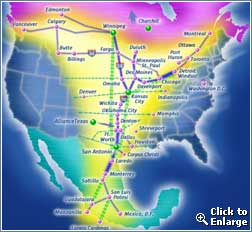If you thought Nafta was bad. Now we have Cafta. This is just another one of the tools used to hack away at the American standard of living we enjoy. Instead of raising the standard of living in these countries, it can only help to lower ours.
The following is reprinted from the Northwest Labor Press:
CAFTA passes, with help of Oregon's Greg Walden
One vote would have made the difference. CAFTA, the Dominican Republic Central America Free Trade Agreement, passed the U.S. House of Representatives just after midnight July 28 in a 217-215 vote. The agreement had earlier passed the Senate with the support of all four Democratic senators from Oregon and Washington.
CAFTA links the United States to Guatemala, El Salvador, Honduras, Costa Rica, Nicaragua and the Dominican Republic in the same way NAFTA combined the U.S., Mexico and Canada.
With such a small margin in favor of CAFTA, Walden’s vote could have made the difference, said Oregon AFL-CIO President Tim Nesbitt.
“The American people are losing confidence in these so called ‘free-trade’ agreements,” Nesbitt said. “They’re beginning to understand it for what it is: It’s about outsourcing and a race to the bottom.”
"The People are the masters of both Congress and courts, not to overthrow the Constitution, but to overthrow the men who pervert it!" Abraham Lincoln... ”As democracy is perfected, the office represents, more and more closely, the inner soul of the people. We move toward a lofty ideal. On some great and glorious day the plain folks of the land will reach their hearts desire at last, and the White House will be adorned by a downright moron.” - H.L. Mencken
Thursday, June 29, 2006
Wednesday, June 28, 2006
The North American Union
Are you struggling with what seems to be an inconceivable future for our country, the end of our sovereinty, the end of our identity, the end of our unique and grand experiment? How could this be happening in what seems to be such a short period of time? How could the very people we depend on to protect us seem to be leading us down this dangerous path? Well, if you look at the agenda of those who are pulling the strings you will see the idea goes back many years. It is not accident or a general deriliction of duty, it is a heinous and well thought out plan.
In March 2005, the leaders of Canada, Mexico, and the United
States adopted a Security and Prosperity Partnership of North America
(SPP)under the advise of the CFR.
The following is a quote from their report
"WHAT WE SHOULD DO BY 2010
• Lay the groundwork for the freer flow of people withinNorth
America. The three governments should commit themselves to
the long-term goal of dramatically diminishing the need for the
current intensity of the governments’ physical control of cross-border
traffic, travel, and trade within North America."
"Canada and the United States should consider eliminating restrictions
on labor mobility altogether and work toward solutions that, in the
long run, could enable the extension of full labor mobility to Mexico
as well."
In March 2005, the leaders of Canada, Mexico, and the United
States adopted a Security and Prosperity Partnership of North America
(SPP)under the advise of the CFR.
The following is a quote from their report
"WHAT WE SHOULD DO BY 2010
• Lay the groundwork for the freer flow of people withinNorth
America. The three governments should commit themselves to
the long-term goal of dramatically diminishing the need for the
current intensity of the governments’ physical control of cross-border
traffic, travel, and trade within North America."
"Canada and the United States should consider eliminating restrictions
on labor mobility altogether and work toward solutions that, in the
long run, could enable the extension of full labor mobility to Mexico
as well."
Thursday, June 22, 2006
MEXICO DIRECTLY PROMOTES INVASION OF U.S.

With friends like this, who needs enemies?
By Jerry Seper of the Washington Times:
Many of the Mexican aid stations are maintained by Grupo Beta, a Mexican governmentfunded humanitarian organization founded in the early 1990s. Driving through the desert regions south of the border in brightly painted orange trucks, Grupo Beta's job is to protect migrants along the border, not arrest them.In April, Grupo Beta worked with the Mexican military and the Sonora State Preventive Police to move would-be illegal aliens out of the desert areas just south of the U.S. border to locations east and west of Naco, Ariz., to avoid the Minuteman Project volunteers holding a vigil on the border.
A branch of Mexico's National Migration Institute, Grupo Beta also helped pass out fliers warning migrants that the Minuteman volunteers, whom they described as "armed vigilantes," were waiting across the border to hurt them.
In addition to the aid stations, the Mexican government has distributed more than a million copies of a 32-page handbook advising migrants how to cross into the United States. The book, known as "Guia del Migrante Mexicano," or "Guide for the Mexican Migrant," contains tips on avoiding apprehension by U.S. authorities.
BUSH SILENTLY PLANS NEW HIGHWAY

From Human Events Online.
by Jerome R. Corsi
Posted Jun 12, 2006
Quietly but systematically, the Bush Administration is advancing the plan to build a huge NAFTA Super Highway, four football-fields-wide, through the heart of the U.S. along Interstate 35, from the Mexican border at Laredo, Tex., to the Canadian border north of Duluth, Minn.
Once complete, the new road will allow containers from the Far East to enter the United States through the Mexican port of Lazaro Cardenas, bypassing the Longshoreman’s Union in the process. The Mexican trucks, without the involvement of the Teamsters Union, will drive on what will be the nation’s most modern highway straight into the heart of America. The Mexican trucks will cross border in FAST lanes, checked only electronically by the new “SENTRI” system. The first customs stop will be a Mexican customs office in Kansas City, their new Smart Port complex, a facility being built for Mexico at a cost of $3 million to the U.S. taxpayers in Kansas City.
Monday, June 19, 2006
Time for Term Limits
If you are as frustrated with politician unaccoutablity as I am, please check out the website of U.S.Term limits. The only way we as a people and the rightful rulers of this great country can regain control of the democratic process is to demand term limits.
Saturday, June 17, 2006
BIG BROTHER IS WATCHING
RFID is rapidly working it's way into all facets of our life, from animals to consumer products that we bring into our home. This is done under the guise of being just an inventory tracking devise but that is not the intent of these people pushing the developement.
FOR IMMEDIATE RELEASE
April 27, 2006
SPYCHIPPED LEVI'S BRAND JEANS HIT THE U.S.
Levi Strauss Confirms RFID Test, Refuses to Disclose Location
It may be time to ditch your Dockers and lay off the Levi's, say privacy activists Katherine Albrecht and Liz McIntyre. New information confirms that Levi Strauss & Co. is violating a call for a moratorium on item-level RFID by spychipping its clothing. What's more, the company is refusing to disclose the location of its U.S. test.
Radio Frequency Identification (RFID) is a controversial technology that uses tiny microchips to track items from a distance. These RFID microchips have earned the nickname "spychips" because each contains a unique identification number, like a Social Security number for things, that can be read silently and invisibly by radio waves. Over 40 of the world's leading privacy and civil liberties organizations have called for a moratorium on chipping individual consumer items because the technology can be used to track people without their knowledge or consent.
FOR IMMEDIATE RELEASE
April 27, 2006
SPYCHIPPED LEVI'S BRAND JEANS HIT THE U.S.
Levi Strauss Confirms RFID Test, Refuses to Disclose Location
It may be time to ditch your Dockers and lay off the Levi's, say privacy activists Katherine Albrecht and Liz McIntyre. New information confirms that Levi Strauss & Co. is violating a call for a moratorium on item-level RFID by spychipping its clothing. What's more, the company is refusing to disclose the location of its U.S. test.
Radio Frequency Identification (RFID) is a controversial technology that uses tiny microchips to track items from a distance. These RFID microchips have earned the nickname "spychips" because each contains a unique identification number, like a Social Security number for things, that can be read silently and invisibly by radio waves. Over 40 of the world's leading privacy and civil liberties organizations have called for a moratorium on chipping individual consumer items because the technology can be used to track people without their knowledge or consent.
The purpose of this blog
The purpose of this new blog is to shine some light on those who are taking our freedoms and rights away.
Subscribe to:
Posts (Atom)